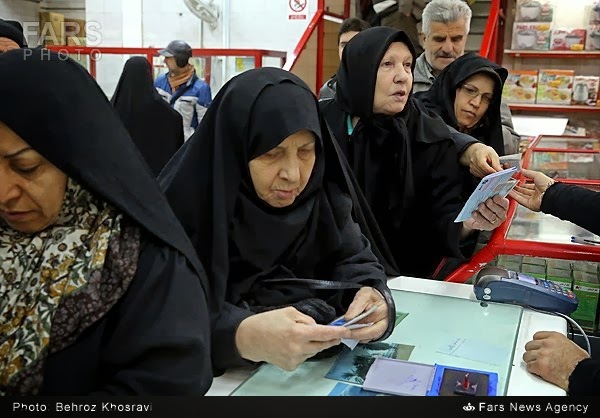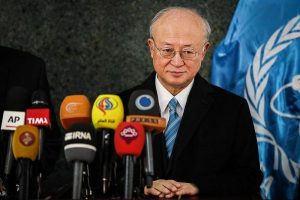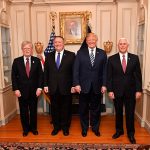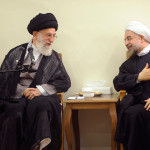by Esfandyar Batmanghelidj
On Aug. 29 the US Treasury added 28 Iranian individuals and entities to its ever-expanding sanctions list. Expectedly, Tehran denounced the decision.
“They are in conflict with the spirit of talks. They are unconstructive in my opinion,” said Iranian President Hassan Rouhani during an Aug. 30 news conference broadcast on State TV.
“We should resist such an aggression with all might and power,” he said. “We consider some of the sanctions crimes against humanity.”
This is not the first time the United States has imposed sanctions on Iran since the historic interim nuclear deal achieved between Iran and the P5+1 (US, UK, France, Russia, China plus Germany) in November 2013, but Rouhani’s words mark a shift in Iran’s reaction. The Iranian president spent considerable time decrying the sanctions in a harsher tone than ever before. Rouhani was sending a message to the United States.
US sanctions on Iran, which have been consistently expanded by Congress and executive orders since 1997, have become so byzantine that they are hindering the activities of countless businesses, Iranian or multinational. The net of financial sanctions has been crafted with such a tight mesh that even harmless, routine trade is constrained and sanctioned.
In concrete terms, the Office of Foreign Assets Control (OFAC), the body responsible for the enforcement of trade and financial sanctions, has extended its regulations to such a degree that many Iranian private businesses are struggling to survive as basic business functions have become nearly impossible. Iranian Banks cannot easily send or receive money abroad, especially if that money needs to be converted into dollars for the transaction, or if the funds must pass through a major bank that conducts significant US business. Airlines cannot readily purchase parts, or refuel in foreign countries. Factories cannot easily secure the inputs of production, or sell their goods overseas. The fact that any private business remains in Iran at all is a testament to the wherewithal of Iranian executives and technocrats.
One could argue that the challenges facing Iran’s business community are offset by the fact that Iran is back at the negotiating table. But Iran expressed a willingness to negotiate before the harshest sanctions were imposed, and the direct consequences of OFAC’s actions have also led to considerable human suffering that could take years to remedy.
When banks, airlines, and factories cannot readily engage in their basic operations, three groups suffer: consumers, employees, and shareholders. In Iran, as in all countries with a private sector, these three groups represent the constituencies of civil society. When sanctions impact banking, it precipitates inflation and currency devaluation that wipes out the real value of savings accounts, leaving families broke or in a state of uncertainty. When sanctions hit airlines, passengers are left boarding ageing and poorly maintained aircraft. Although the US claims it is not targeting average Iranians, financial sanctions constrain factories that process food, manufacture medicines, or refine oil, leaving consumers with ever-increasing prices for basic goods like bread, antibiotics, and gasoline.
Since 2006, when the Iran Sanctions Act was strengthened and extended, Iran’s Consumer Price Index increased from about 40 points to 195 points in 2013, according to data from the Central Bank of Iran. Similarly, the Producer Price Index shot up from its record low of 153 points in 2008 to almost 550 points in June 2014. Most troublingly, monthly food inflation has averaged 38% for the last two years and has only recently begun to stabilize.
As a result, sanctions harm civil society, which we in the West claim to cherish as the foundation of moderate politics. Compounding Iran’s problems, unemployment creeps upward, and business owners cease investing in growth and innovation because they have to search for ways to preserve their wealth, which leads to capital flight. According to the World Bank, Iran’s economy shrank by nearly 6% in 2013. Although last year’s interim nuclear deal, the Joint Plan of Action, offered Iran modest sanctions relief, Iranians, especially the middle class, are still struggling to lead normal lives. Today Iran’s economy remains closer to the brink of collapse than to recovery.
So as OFAC has strengthened its position, sanctioning individuals and business entities while demanding record fines from entities that have long traded with Iran—European banks in particular—the Iranian people have unduly suffered. This has not been unknown to policymakers in Washington. Countless papers from think tanks, academic institutes, and government offices have highlighted the ways in which sanctions have harmed ordinary Iranians. But the collateral damage seemed justified during the overlapping Ahmadinejad and Bush presidencies, when there was no hope for détente.
Yet the presidential election of Rouhani last year paved the way for a new era in US-Iran relations. The cautious optimism was boosted by the interim nuclear agreement. Now the role of OFAC must come under greater scrutiny. President Barack Obama has clearly expended immense effort and political capital to push forward the negotiations since Rouhani became president. Yet OFAC and its agents take extraordinary measures to sanction companies, many of whom claim they have done nothing more than try and survive in an impossible economic and regulatory environment. Should OFAC tow the line of anti-engagement proponents in Congress and hawkish advocacy groups, we may be condemned to a further decade of antagonism with Iran, the resilient and capable partner sorely needed in a region descending into chaos.
Photo Credit: Behroz Khosravi/Fars






These stooges just can’t bend over far enough, in licking the boots while inserting their heads up where the sun don’t shine. Payoff to some other foreign power? What do you think. These people are hell bound to destroy the planet, in more ways than one. From financial to bombs, but look at the M.E. since the “war on terror”, as a shining example of the thinking/planing. Talk of watching the human race, to the bottom if not to extinction, all for a foreign power. Way to go stooges in the U.S.Government. I guess one might conclude this latest is in hope of not having to answer the children/grandchildren when they ask: “what did you do for your country daddy/mommy”.
According to the pentagon, state department plan the regimes in Libya, Syria, Iraq and Iran needs to be changed. This is nothing new, this and other plan alike has been introduced to WH since 1990. Thus far Libya and Iraqi regimes been changed to more or less Islamic system.
Barack Hussein Obama policy toward Syria and Iraq been a militarization/Islamization scenario, yet the Islamization of the region is what has become the favorite of the war party, both democrats and republicans. By English/USG/McCain giving free hand to all and every Islamic sect and systems out there have resulted in ISIS. A barbaric caliphate brutal and fascistic system as in Saudi Arabia/UAE. USG and English, and some of Europeans government still doing what they can to implement a total regime change as planed, therefore, the west always change and demand for new matters involving Iran nuclear deal. Here bad for Iranian to change the matter there is only one way left, to get out of the negotiation and let EU/English/USG do whatever the sanction they think is good for them. If nothing the European unemployment from average 15% will grow into 25% as in Spain.
Everything, anywhere where USG/English with their partners in wars or otherwise, touched have developed into disastrous consequences for the nation, from Vietnam nam to present Ukrainian installed Neo fascism, to Libya, to Syria to Iraq and now they are after Iran.
Norman is correct. Our entire Middle East policy is shaped by a hard core body of Israel Firsters who occupy over 70% of top U.S.govt positions. They are working for the foreign country that they believe in. The problem is with the U.S. congress that is shamefully self-serving, cowardly,and in fact betraying the U.S. for the benefit of, and at the behest of, a foreign country. The blood of thousands of American men and women has been shed because of a stupid, immoral congress, and billions of tax payer dollars have been expended in this wholesale betrayal of the American people. It is time — past time — to call it what it is: treason. An accounting must come, sooner or later, and members of congress along with others will end up either in orange jumpsuits in federal prisons or else see their reputations irreparably damaged for all time.
If any blame needs to be laid, it needs to be laid at the mouth of Khamenei. The guy is unfiltered, honest and kind of crazy when at a critical juncture in negotiations he begins giving speeches about Iran never giving in on centrifuges, nor ever abandoning its missile technology to deliver nuclear weapons. These are not reassuring and are about as political adept as Ahmadinejad’s Holocaust denials. So we are left with two conclusions. Khamenei was sane, conscious and knowledgeable in what he was doing and saying and his intent was clear; to kill negotiations and keep Iran on a path towards nuclear development regardless of what the West wants; or he is simply a crazy old man. Oddly enough, I find the first possibili;ty more reassuring because the latter would be frankly pretty terrifying considering Khamenei’s word is final the absolute law in terms of foreign policy, defense and military matters.